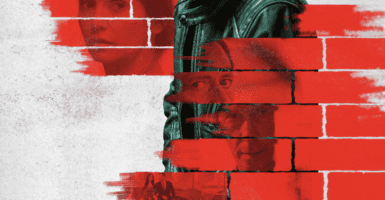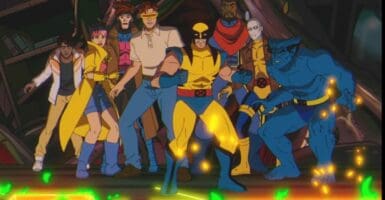George Lucas Tells George Lucas To Stop Messing With Star Wars
This article is more than 2 years old

Whenever George Lucas decides to tinker with Star Wars there are inevitably a few things that happen. First the fans get up in arms about how he’s destroying the films; meanwhile the vast majority will still buy the bastardized versions. Thus proving that Lucas knows what he’s doing and will continue to kick his creations in the nards whenever possible to make a buck. The other thing that occurs is the reemergence of the famed 1988 speech where he calls out the potential for harmful editing of already released films.
Save Star Wars has posted up, once again, the entire speech with a lengthy analysis. In 1988 Lucas stood before Congress to rally for a law that would protect the original works of filmmakers. At the time Ted Turner was colorizing old black and white films, which angered the original creators. But nothing could be done about it since Turner owned the movies. The fight made it all the way to Congress, and below you can read Lucas’ impassioned plea to have a law passed that could protect the original works of art.
Funny enough, this letter has resurfaced on the internet a number of times. It’s not like this is news to anyone. And to be honest, the hypocrisy exercised based on what was said 23 years ago is at maybe 67%. No law was passed, so that leaves not only the studios free to make changes as they see fit, but also the creators. And since Lucas is talking about preserving the original prints, but not specifically saying the director/creator should be banned from altering things, then there’s a little wiggle room.
Look, I’m not going to buy these ridiculous Blu-ray copies of the films. I’ve long ago given up on Star Wars. Sorry, but I decided to take a stand. I’ll leave the bitching and moaning to others. Me? Well, I’m just going to do what I’ve always done and not give LucasFilms a dime of my money for the altered versions.
Read Lucas’ own words for yourself:
My name is George Lucas. I am a writer, director, and producer of motion pictures and Chairman of the Board of Lucasfilm Ltd., a multi-faceted entertainment corporation.
I am not here today as a writer-director, or as a producer, or as the chairman of a corporation. I’ve come as a citizen of what I believe to be a great society that is in need of a moral anchor to help define and protect its intellectual and cultural heritage. It is not being protected.
The destruction of our film heritage, which is the focus of concern today, is only the tip of the iceberg. American law does not protect our painters, sculptors, recording artists, authors, or filmmakers from having their lifework distorted, and their reputation ruined. If something is not done now to clearly state the moral rights of artists, current and future technologies will alter, mutilate, and destroy for future generations the subtle human truths and highest human feeling that talented individuals within our society have created.
A copyright is held in trust by its owner until it ultimately reverts to public domain. American works of art belong to the American public; they are part of our cultural history.
People who alter or destroy works of art and our cultural heritage for profit or as an exercise of power are barbarians, and if the laws of the United States continue to condone this behavior, history will surely classify us as a barbaric society. The preservation of our cultural heritage may not seem to be as politically sensitive an issue as “when life begins” or “when it should be appropriately terminated,” but it is important because it goes to the heart of what sets mankind apart. Creative expression is at the core of our humanness. Art is a distinctly human endeavor. We must have respect for it if we are to have any respect for the human race.
These current defacements are just the beginning. Today, engineers with their computers can add color to black-and-white movies, change the soundtrack, speed up the pace, and add or subtract material to the philosophical tastes of the copyright holder. Tomorrow, more advanced technology will be able to replace actors with “fresher faces,” or alter dialogue and change the movement of the actor’s lips to match. It will soon be possible to create a new “original” negative with whatever changes or alterations the copyright holder of the moment desires. The copyright holders, so far, have not been completely diligent in preserving the original negatives of films they control. In order to reconstruct old negatives, many archivists have had to go to Eastern bloc countries where American films have been better preserved.
In the future it will become even easier for old negatives to become lost and be “replaced” by new altered negatives. This would be a great loss to our society. Our cultural history must not be allowed to be rewritten.There is nothing to stop American films, records, books, and paintings from being sold to a foreign entity or egotistical gangsters and having them change our cultural heritage to suit their personal taste.
I accuse the companies and groups, who say that American law is sufficient, of misleading the Congress and the People for their own economic self-interest.
I accuse the corporations, who oppose the moral rights of the artist, of being dishonest and insensitive to American cultural heritage and of being interested only in their quarterly bottom line, and not in the long-term interest of the Nation.
The public’s interest is ultimately dominant over all other interests. And the proof of that is that even a copyright law only permits the creators and their estate a limited amount of time to enjoy the economic fruits of that work.
There are those who say American law is sufficient. That’s an outrage! It’s not sufficient! If it were sufficient, why would I be here? Why would John Houston have been so studiously ignored when he protested the colorization of “The Maltese Falcon?” Why are films cut up and butchered?
Attention should be paid to this question of our soul, and not simply to accounting procedures. Attention should be paid to the interest of those who are yet unborn, who should be able to see this generation as it saw itself, and the past generation as it saw itself.
I hope you have the courage to lead America in acknowledging the importance of American art to the human race, and accord the proper protection for the creators of that art–as it is accorded them in much of the rest of the world communities.












